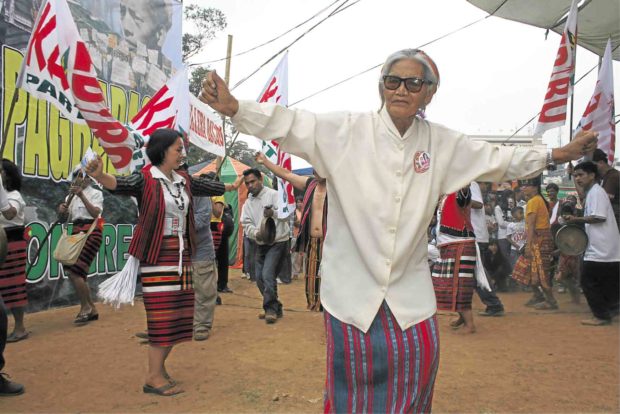
Petra Macliing—PHOTO from CWEARC
BONTOC, MOUNTAIN PROVINCE — In the 1970s, militant women led by Petra Macliing from Barangay Mainit here, stripped naked when they confronted engineers of a mining company that planned to operate near their mountain community.
One of them, Chamgay Tay-ug, recalled that Macliing, Mother Petra to most of them and Tannao to her, gathered them and “told us that they would stop [the mine] from destroying our mountain.”
Tay-ug said the women climbed the mountain where the engineers were drilling, and they “removed their clothes like what Tannao told us.”
“We dared them to harm the womb from where they came,” she said.
After sending the engineers away, the women raided the miners’ camp and took all of their supplies. “We did not eat their food. We just wanted them to leave,” Tay-ug said.
The feat of the Mainit women was recalled last week when they paid tribute to Macliing, who died on May 25 at the age of 90.
Protecting families
“We may not be armed but our hands are our weapons. We use our bare hands to squeeze balls, the balls of men,” the women recalled the chants in many political gatherings to show the lengths mothers in upland communities would take to protect their families.
Despite the similar names, Mother Petra was not related to Macli-ing Dulag, the Butbut tribe “pangat” (leader) in Kalinga province who was assassinated in 1980 for opposing the Chico River dam project of the late dictator Ferdinand Marcos.
But like Dulag, Mother Petra also opposed the World Bank-funded project as well as the entry of mining operations in her province.
Cordillera unity
She attended the “bodong” (peace pact) assemblies where tribe leaders from Bontoc and Kalinga discussed the impact of the Chico River projects on the villagers, according to Joanna Cariño of the militant Cordillera Peoples Alliance.
These meetings unified the Cordillera against the dam project as well as corporate logging in Abra province.
From 1981 to 1983, Macliing helped form the Cordillera Bodong Association and became the only female pangat. At 70, she helped form the Cordillera Elders Alliance in 2006. She traveled to the Cordillera provinces to speak to fellow elders about their continuing struggle for social justice.
In 2009, Macliing was one of nine women awarded the Laureate Prize for Rural Women by the Women’s World Summit Foundation for her “pioneering work to the Cordillera people’s struggle for indigenous peoples’ rights to their land and to self-determination.”
In 2012, she was honored by the Asian Rural Women’s Coalition during the 5th International Day of Rural Women “for combating violence against women and for seeking better treatment of the rural poor, political prisoners, farmers and children.”
But for many who attended her wake last week, they grieved for a mother and a community elder.
Raising eight kids
Macliing lost her husband and was left to raise eight children by herself. She earned a living by farming or by tending to a sari-sari store to put her seven daughters through college. Her only son died at a very young age.
Lawyer Francesca Macliing-Claver, the youngest child, said she was 3 months old when her father died. “My mother was the only parent I have ever known,” she said.
Georgia Velasco of the Cordillera Elders Alliance said she met Macliing in early 1980s when the latter encouraged her peers to take adult literacy classes.
“She valued education and never stopped learning and sharing what she learned with others, even though she never earned a college degree,” Velasco said.